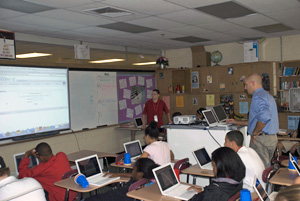 June's Member of the Month is William Ian O'Byrne (who we know as "Ian"), an assistant professor of educational technologies at the University of New Haven. In this interview, he shares how he transitioned from a middle and high school teacher to a university teacher who focuses on research about digital learning. He also talks about the digital and non-digital parts of his life, how teachers can integrate technology into their lives inside and outside the classroom, and how International Reading Association (IRA) membership makes difference.
June's Member of the Month is William Ian O'Byrne (who we know as "Ian"), an assistant professor of educational technologies at the University of New Haven. In this interview, he shares how he transitioned from a middle and high school teacher to a university teacher who focuses on research about digital learning. He also talks about the digital and non-digital parts of his life, how teachers can integrate technology into their lives inside and outside the classroom, and how International Reading Association (IRA) membership makes difference.
When did you know you wanted to become a teacher?
I'm the oldest of seven children from a mixed family. To certain extent I've always worked with guiding children, whether they were family, or friends. My Nan believed that I would grow up to be a doctor. She initially thought that I would be a pediatrician given how much I cared about the well-being of children. I like to think that she would be proud of my current career path.
How long have you been a member of the International Reading Association? How has membership influenced your career?
I have been a member of IRA since entering into the world of literacy research. My research interests focus on the knowledge, skills, and dispositions of individuals as they use digital texts and tools for literacy practices. The International Reading Association allows me to connect with teachers that are trying to build these skills and capacities in students while integrating them into authentic learning activities. Put simply, working with IRA allows me to think about whether my ideas would "work" in the real-world classroom.
You're a member of IRA's Technology in Literacy Education Special Interest Group (TILE-SIG). How long have you been a member, and how has the experience been?
I have been a member of IRA's TILE-SIG for as long as I've been a member of IRA. This collection of researchers and scholars is also invaluable as it provides me an opportunity to reassure myself that my field of research is important. Sometimes I'll have an idea that seems like it would have the ability to change an aspect of the classroom. Membership in the TILE-SIG allows me to look across the thinking and work of a number of excellent teachers and researchers that are also pushing the same agenda. It's important to feel like a community that is thinking about the same changes occurring to literacy.
As well as contributing to Reading Today Online, you have your own blog and you're on Twitter, Google+, and a bunch of other sites! How are you using technology, websites, and social media for teaching students and for your own professional development? Do you have any advice to educators who may be nervous about becoming involved in new technology?
 I regularly post to my own blog (http://wiobyrne.com/), Google+, and Twitter. I mostly use these venues to think through and reflect on ideas I have as I think about education, technology, and literacy. The links that I share and my blog posts are primarily as way for me to reflect on the themes and trends that I see in my field. I also share information on various digital texts and tools that I believe teachers should be using in their classrooms. When I work face-to-face with a teacher, or group of teachers, there is only so much time that can be spent in a workshop, class, or professional development session. We also know that these digital texts and tools are constantly changing and providing new opportunities for teachers and students. My hope is that through the use of these communication tools we can "keep the discussion" going after our time together has ended.
I regularly post to my own blog (http://wiobyrne.com/), Google+, and Twitter. I mostly use these venues to think through and reflect on ideas I have as I think about education, technology, and literacy. The links that I share and my blog posts are primarily as way for me to reflect on the themes and trends that I see in my field. I also share information on various digital texts and tools that I believe teachers should be using in their classrooms. When I work face-to-face with a teacher, or group of teachers, there is only so much time that can be spent in a workshop, class, or professional development session. We also know that these digital texts and tools are constantly changing and providing new opportunities for teachers and students. My hope is that through the use of these communication tools we can "keep the discussion" going after our time together has ended.
I believe all teachers and educators should have an online "brand." I work with individuals to find ways that they can "create and curate their online brand." There are obviously numerous elements that need to be discussed in this work, including issues of privacy, identity, and capacity. Usually I prefer to meet with teachers to discuss these larger questions that need to be addressed so the educator knows exactly what they're doing when they post materials online. That being said, teachers should be creating and curating not only their online brand, but more importantly making teaching resources available for their students and the community. The challenge is how to do this while making sure that you are protected.
You conduct research on "the literacy practices of individuals as they read/write in online spaces." What do you think are the most common misconceptions about how students read and learn to read in this digital age?
It is an ambitious statement, but I believe that all individuals should be empowered to use the reader/writer nature of the Internet and other communication tools. Of course this includes all teachers and students. Work such as this demands a larger discussion about empowerment, and the social imperatives associated with use of the Internet in the classroom. In consideration of this focus of my work, one of the biggest challenges that I have had to deal with is the belief that students are "digital natives" and (for the most part) teachers are "digital immigrants." I understand the argument that Marc Prensky was trying to make in identifying this distinction. I believe the "digital natives" debate set our field back ten years for educators thinking about using technology.
 One of the effects of the "digital natives" debate is visible as educators resign themselves to thinking that they are not as knowledgable or skilled in the use of technology as their students based on age. Using this same logic as the "digital natives" debate, students that were born during the agricultural revolution should have a natural skill or propensity in the use of the rake or hoe. I prefer to think that skill and use in these new and digital literacies is more rooted in individual teacher (and student) dispositions than age, gender, or another designation.
One of the effects of the "digital natives" debate is visible as educators resign themselves to thinking that they are not as knowledgable or skilled in the use of technology as their students based on age. Using this same logic as the "digital natives" debate, students that were born during the agricultural revolution should have a natural skill or propensity in the use of the rake or hoe. I prefer to think that skill and use in these new and digital literacies is more rooted in individual teacher (and student) dispositions than age, gender, or another designation.
That being said, I watch in amazement as my son deftly moves from computer, to tablet, to picture book as he "reads" information of different sources. I think this will have a dramatic effect on his expectations for how his teachers will frame teaching and learning in the classroom. He'll expect to learn across a variety of multimodal texts and be allowed to co-construct and collaborate with peers globally on assignments. This will require many of the same teaching skills and pedagogies that the field calls for as new technologies inundate society. I just don't think that my son innately understands these digital texts and tools because he's younger.
We're almost at the end of the K-12 school year. Do you have any advice on how teachers and parents can prevent the dreaded "summer slide"?
From my years teaching middle and high school I know it was always tricky in trying to keep students on task while the end of the school year loomed. My focus was on building up many of the established routines that I had built up over the year. I also saved a good amount of the hands-on work and creation that students would enjoy. Most of all I saved the books that I would enjoy…and I knew students would enjoy.
What do you consider to be your proudest career moment?
I would like to think that I haven't had my proudest career moment yet. If I had to pick one I would say it would have been coming home from successfully defending my dissertation and telling my son that we finally did it. He was 2 1/2 at the time and it meant nothing to him, but it meant the world to me.
What do you like to do when you're not wearing your educator hat?
While not teaching, reading, or researching I using spend my time playing with my son. This usually involved playing with cars, reading, building computers, Dance Party on the Wii, coloring, and goofing off.
What's the best advice you could offer someone new to the profession?
Build up your digital footprint. Think and be thoughtful in the development and evolution of your digital identity over time. It's okay to have fits, spurts, and redirections as you develop your online identity. Continue to develop, reflect, and revise this online brand as your needs change.
Also work to build up the digital footprint of your students over time. The use of a digital footprint as a formative and summative assessment in all classrooms can be a powerful learning tool.